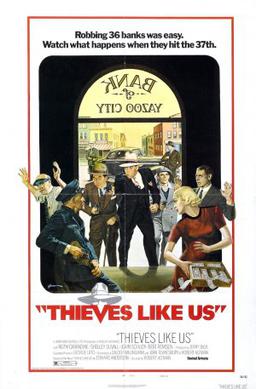Directed by the master of the period drama, Robert Altman, 'Thieves' is an incredibly realistic, very truthful retelling of the 1930s and the life of crime that was often a direct result of the tough times. From the clothes to the sets to the almost-constant radio programming in the background, this movie feels like the 1930s. That decade had a certain look that translates well to movies. And instead of focusing on John Dillinger or some of the other high-profile crooks of the era, Altman focuses on three low-level bank robbers making their way across the south with eyes on acquiring as much money as possible.
Escaping from a prison work farm in the deep south, Bowie (Keith Carradine) and Chicamaw (John Schuck) team up with a third escaped convict, T-Dub (Bert Remsen), and hit the road. Bowie's two new partners both have some experience as bank robbers so the trio decides to hit a couple banks to help them live a better life. And at first, things go smoothly, but soon enough, their names and pictures are plastered across several states with a reward posted for information on them. In between jobs, the trio splits up with Bowie moving in with a girl in Mississippi, Keechie (Shelley Duvall), who wants him to leave his gang. But Bowie feels pulled both ways because he loves Keechie, but Chicamaw and T-Dub are his only friends in the world. With the noose tightening around their necks, the young, naive criminal is forced to make a decision.
In 1974, Carradine was one of many rising stars in the movies, but he never became a huge mega-star. Maybe it was for the best, he was always so strong in smaller movies like this one that were focused on story and character above all else. His Bowie is the main character in 'Thieves' and a likable one at that. He gets involved with two veteran crooks, and it's usually those two where the violence comes from. Bowie sticks with them because it's all he knows. Most of the time, he serves as the getaway driver. The other plotline is the relationship that develops between him and Keechie which is surprisingly sweet and effective. They're both naive to just about everything, and end up being a perfect match together.
It's a good thing that Carradine and Duvall are likable because with a gangster story, it's not always easy to get behind the main characters. Don't expect a whole lot of action here, instead it is more of a budding love story with a few bank robberies thrown into the mix. As for Bowie's partners, the two performances are equally strong if not equally likable. Schuck's Chicamaw is a drunk and an angry one at that, while Remsen's T-Dub provides some funny moments with his boasting of all the robberies he's lead, but he ends up coming off as a horny old guy. Other worthwhile supporting parts include Louise Fletcher as Mattie, T-Dub's sister-in-law, and Ann Latham as Lula, T-Dub's main squeeze who I think is also a relative. Tom Skerritt is wasted as Dee Mobley, Keechie's uncle who helps Bowie and Co. following their robberies.
All the positives aside, I had some issues with the movie. Altman is in no rush to move his story along with a leisurely 123-minute run time. That's all right with many stories because the end result is always in site down the road somewhere. SPOILERS Stories with 30s crooks typically don't end well for the crooks because eventually the cops/FBI/authorities close in and finish the job. By the end, T-Dub and Bowie are dead with Chicamaw's fate left undecided. We don't see any of this though. T-Dub is killed off-screen, and we hear about it via a radio report, and Bowie is ambushed in a small cabin, but we only see the shooting from the outside. I'm not calling for a gory, viciously bloody ending, but by this point, I've come to like the characters flaws and all. Just hearing about their deaths or knowing what's happening isn't enough. And in a way, I feel cheated. END OF SPOILERS
Good and bad, I did like this movie, but I didn't love it. Watching a story about 1930s era gangsters, it's hard not to compare Thieves Like Us to movies like Bonnie and Clyde, Dillinger, and even more recently with Public Enemies. It's an enjoyable enough movie, but it's not on the level of those three movies. A sometimes too leisurely pacing does slow the movie down too much, and some creative choices Altman made ended up bugging me a lot in terms of character. I wanted to like it more, but it is a quality movie and quite a window into the 1930s.
Thieves Like Us <----trailer (1974): ** 1/2 /****


No comments:
Post a Comment